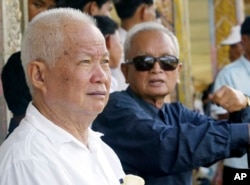The Khmer Rouge tribunal is to announce verdicts on Friday against the two senior surviving regime officials, Nuon Chea and Khieu Samphan, for crimes against humanity and genocide committed under the totalitarian regime.
In 2014, the court found Chea, 91, and Samphan, 86, guilty of several charges filed in Case 002/01 and sentenced them to life in prison.
However, experts on the Extraordinary Chambers in the Courts of Cambodia (ECCC), the official name for the tribunal, have mixed views on the legacy and impact the court has had.
Daniel McLaughlin, a senior attorney at the Center for Justice & Accountability (CJA), said the group hoped that the judgement will be “a fair and impartial assessment of the scale of these crimes and of the two defendants' responsibility - one that creates an incontrovertible record of the period and acknowledges the suffering of the victims and survivors who have bravely continued to seek accountability for the past four decades.”
Chea and Samphan were already found guilty on separate charges in Case 002/01 in 2014. The current trial covers broader charges related to a range of atrocities, including genocide against the Cham Muslim and Vietnamese minorities, forced marriage, rape, internal purges, and alleged crimes committed against Buddhists and former Khmer Republic officials. More than 110 witnesses gave evidence, including more than 60 civil parties and eight experts.
“One of the successes of this hybrid tribunal, is that victims were able to participate directly and provide evidence as civil parties and complainants before the court. As this, and similar tribunals continue their work, it’s vital that these institutions provide victims and affected populations a sense of ownership over the proceedings and their outcomes. The justice rendered is first and foremost theirs,” McLaughlin said.
Peter Maguire, author of “Facing Death in Cambodia”, said the court’s legacy was “part good, part bad, and part ugly,” having spent some $300 million to try just three Khmer Rouge officials.
“Within the spectrum of political justice the ECCC stands above farces like the American ‘trials’ at Guantanamo Bay or spectacles of primitive political justice like the Yamashita Case, but far below flawed, yet ultimately successful trials like [the] Nuremberg International Military Tribunal. It would be easier to consider the ECCC ‘a success’ had its boosters in the UN and the human rights industry not raised expectations so high and oversold it so grossly,” he said.
McLaughlin also urged stakeholders to consider the legacy of the court and remaining cases.
“The legacy of the ECCC remains to be determined. There is still much more that can and should be done for the victims and survivors of the Khmer Rouge, including by this court, but the conclusion of Case 002/2 represents a positive step forward,” he said.
Sophal Ear, associate professor at Occidental College in Los Angeles and a victim of Khmer Rouge, said justice must be seen to be done.
“We need to see that justice was achieved, however modest, for the Cambodian people. If you kill 1.7 million, you will be punished. We should also see that if you kill one person, you will be punished. That is not yet the case in Cambodia; far from it,” he said.
“It was far from perfect; it sought to do things that cannot be expected of a court. It could not heal the people. It cost way too much money and took far too many years. It is mostly negative in my view having been captured by the authorities and starting off with the rather garden variety Duch, an open and shut case that it still managed to mess-up because of the laughable original verdict,” he said.
“But beyond this, Khieu Samphan and Nuon Chea only, seriously? There are still many Khmer Rouge leaders who will never face justice. Why?”
Bryant Ben, 62, a victim from Long Beach California, filed a complaint at the court through the Center for Justice & Accountability (CJA).
He said the court is seeking justice for the victims although it has taken a long time.
“The trial, no matter if it’s long time or sooner, for me as a victim I can never forget it. It’s so important that the court render justice for the victims who are not be able to stand up to directly to confront the case at the court,” he said.





